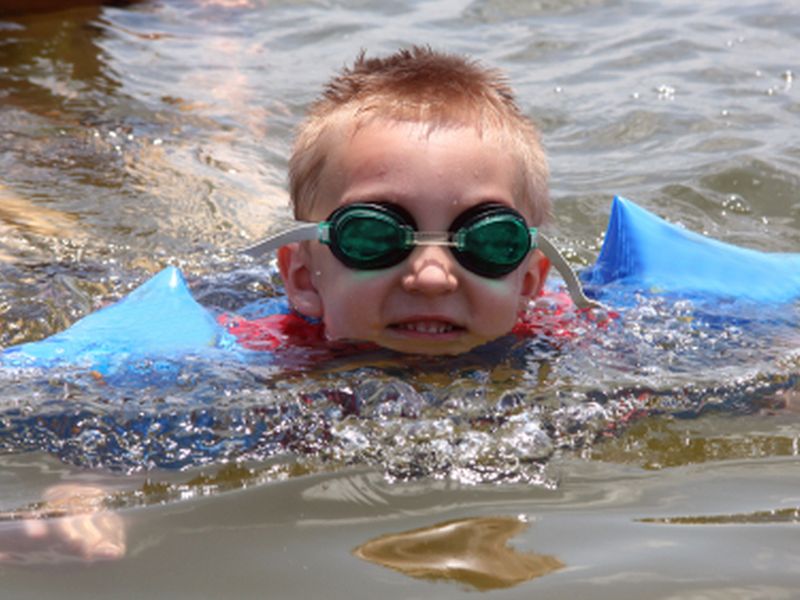Don’t Get Sick While Swimming This Summer
 By Steven Reinberg
By Steven Reinberg
HealthDay Reporter
TUESDAY, June thirty, 2020 (HealthDay News)
Swimming and summertime are almost synonymous, but getting sick from germs in lakes, rivers and the ocean can spoil the enjoyable, U.S. health and fitness officers warn.
Because 2009, almost one hundred twenty illness outbreaks in 31 states have been tied to untreated recreational drinking water. But staying aware of possible harms and getting safeguards can aid maintain you nutritious even though you amazing off, in accordance to a new report from the U.S. Facilities for Illness Command and Prevention.
“Swimming is a great opportunity to be physically energetic, and we are telling the community just do it in a smarter, a lot more nutritious way,” mentioned report co-writer Michele Hlavsa, chief of the CDC’s Healthy Swimming Application.
Contamination can arise from many sources, she mentioned. These include things like storm drinking water runoff, septic or sewer overflow, or drinking water from farms or wastewater procedure crops. “They add poop to the drinking water,” Hlavsa famous. Also, animals could defecate on the beach or in the drinking water.
The most frequent infections are from germs, and include things like norovirus, Shiga toxin-creating E. coli, Cryptosporidium and Shigella.
These germs can bring about nausea, diarrhea, vomiting and fever. Most normally, these circumstances go away by them selves, but for some, like young children and the elderly, these infections can be lethal. Older people today with persistent circumstances or compromised immune programs can be especially inclined to getting sick.
“One particular of the outbreaks highlighted in this report included a toxin-creating E. coli that can most likely bring about a unsafe infection that can guide to hemolytic uremic syndrome,” Hlavsa mentioned. This “can bring about challenges with the kidneys and most likely guide to demise,” she described.
Swallowing contaminated drinking water is 1 of the most frequent approaches of getting contaminated. She mentioned youngsters swallow 2 times as considerably drinking water as individuals aged 18 and more mature. They could need reminders not to do so.
“This is not a 12 months wherever we need an E. coli outbreak on prime of a pandemic,” mentioned Dr. Marc Siegel, a professor of drugs at NYU Langone Health care Centre in New York City.
Facts from the CDC’s National Outbreak Reporting System discovered that between 2009 and 2019, there had been 119 outbreaks from recreational drinking water in 31 states that sickened a lot more than 5,200 people today.
Just about 90% of these outbreaks bought their begin from June as a result of August.
Hlavsa thinks the difficulty is more substantial than the details indicate, because most people today who get sick from these germs you should not see their health care provider or go to hospitals.
People today who manage swimming parts have a responsibility to be sure the beach and drinking water usually are not contaminated, she mentioned.
“They ought to be frequently monitoring the drinking water high-quality, looking for germs,” Hlavsa mentioned. “They ought to also know the kind of geography and topography of the region surrounding the beach and the possible sources of contamination.”
For safe swimming, Hlavsa advises the next:
- Really don’t swim when the pool or beach is shut, and check drinking water high-quality advisories.
- Really don’t swim when the drinking water is cloudy soon after a significant rain.
- Really don’t swim when sick with diarrhea.
- Really don’t swallow the drinking water.
- Maintain sand out of your mouth.
Siegel extra that you shouldn’t permit your young children swim if they usually are not bathroom-educated. Kids who go to the toilet in the drinking water can be a resource of bacterial infection. He also instructed sporting swim goggles to maintain drinking water out of your eyes.
Siegel mentioned you is not going to get COVID-19 in the drinking water, but you could get it from people today in close proximity to you, so view your surroundings meticulously.
“Be doubly careful because of COVID-19,” he suggested. “Acquire a shower right before and soon after swimming.” If you swim in a pool, “be sure it truly is disinfected,” he mentioned.
An additional unsafe germs discovered in drinking water is the so-referred to as flesh-taking in germs V. vulnificus, which can bring about lifetime-threatening wound infections.
Even so, Siegel famous that this is really rare and not a thing people today truly need to fear about.
The CDC says that only 205 situations of V. vulnificus arise each 12 months, and that is between thousands and thousands of Us residents who swim in lakes and oceans. Nevertheless, 1 in 7 do die from the infection, and the company advises keeping out of salt drinking water or brackish drinking water if you have a slash or scrape.
The report was published June 26 in the CDC’s Morbidity and Mortality Weekly Report.

Copyright © 2020 HealthDay. All rights reserved.
SLIDESHOW
Bacterial Infections one zero one: Styles, Signs or symptoms, and Treatments
See Slideshow
References
Resources: Michele Hlavsa, M.P.H., chief, Healthy Swimming Application, U.S. Facilities for Illness Command and Prevention Marc Siegel, M.D., professor, drugs, NYU Langone Health care Centre, New York City Morbidity and Mortality Weekly Report, June 26, 2020

